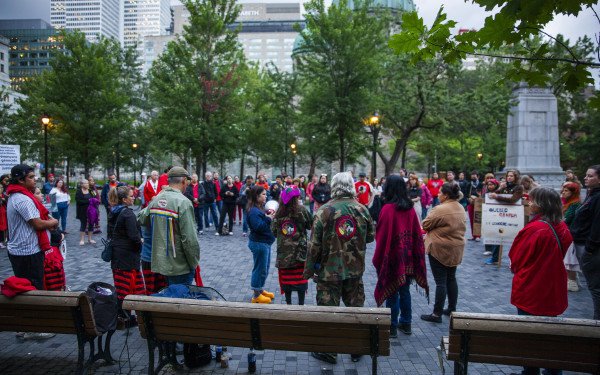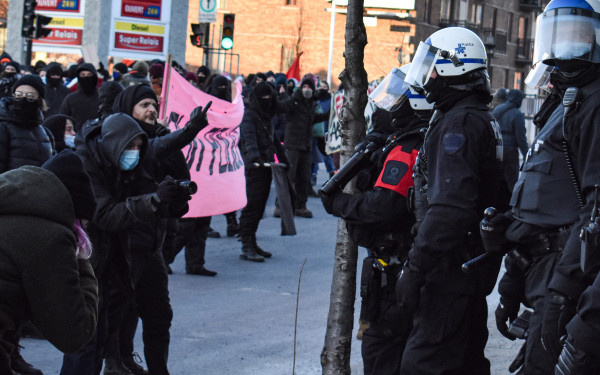Marching for Truth and Reconciliation
Montrealers mobilize for fourth annual Every Child Matters march
Hundreds of Montrealers marched on Sept. 30 to commemorate the Indigenous Survivors and victims of the residential school system in Canada.
People gathered in Mount Royal Park at 1 p.m. and marched to Place Ville Marie in downtown Montreal while chanting phrases such as "Land back” and “No pride in genocide.”
“The importance of this march is to honour the Survivors of residential schools and how they impacted the Indigenous population,” said Selena Martineau, a protestor and employee at Resilience Montreal. Resilience Montreal is a shelter for Montreal’s unhoused population, who co-organized the march. “We are here to uplift them as much as possible and honour what they’ve gone through,” Martineau said.
This march was additionally co-organized by the Native Women’s Shelter, a shelter dedicated to providing support and frontline services to Indigenous women and their children.
Nine speakers as well as a residential school Survivor spoke to the crowd preceding the march. Demonstrators marched through Parc Ave., Sherbrooke St. and Mansfield St. to René-Levesque Blvd.
“[Indigenous peoples] gave up their lives, they gave up their language, they gave up their cultures, as lessons for us to take,” said Alex McComber, assistant professor of family medicine at McGill University. “We say never again, this will never happen again to any of our children.”
Philippe Tsaronséré Meilleur is the director of Native Montreal, an organization specializing in offering services and community connection to Indigenous children and families.
“It’s important for Indigenous people and allies to have a moment to be able to say, through society, that the changes have not already taken place to stop intergenerational harm for Indigenous children,” Meilleur said. “It's important for us to feel that we’re all together to say this message and to allow allies that have moments to also come and support us.”

From the 1830s to 1996, Christian church organizations and the Canadian government forcibly removed children between the ages of 4 and 16 from their family and forced them to attend residential schools in Canada. The goal was to erase Indigenous cultures and to assimilate Indigenous children into European settler colonialism.
The orange shirt is an emblem, with rich history, which raises awareness of the abuse that Indigenous children had endured in residential schools.
As a girl, Phyllis Webstad was forced to attend a residential school. On her first day, she wore a bright orange shirt given to her by her grandmother. Residential school administrators cut off her hair and stole her belongings, including Webstad’s orange shirt, which she never wore again.
According to research conducted by the Save the Children Canada organization, residential schools had a rate of mortality rate between 40 and 60 per cent, and the majority of children experienced severe physical, emotional and sexual abuse.
In Canada, hundreds of unmarked children’s graves have been discovered on the sites of old residential schools in recent years.
According to Kahsennenhawe Sky-Deer, former grand chief of the Mohawk Council of Kahnawà:ke, this is not the only problem. Sky-Deer said the Canadian government often makes empty promises regarding the needs of Indigenous communities. She stressed how boil advisories and a lack of infrastructure and housing are problems for many First Nations, Métis and Inuit communities.
“We have to do something, we have to get them off their feet to make some real substantial changes to our nations, to our communities,” Sky-Deer said. “It shouldn’t be like this in 2024, our people have been through so much.”
This article originally appeared in Volume 45, Issue 3, published October 1, 2024.


_600_832_s.png)




